What is Blockchain?
Blockchain is the technology that powers the Bitcoin cryptocurrency.
But this is not about accepting and making payments in Bitcoin – the reason why it hasn’t gained acceptance is because the value of the currency itself changes according to the laws of supply and demand. Other international currencies make use of the gold standard to lend them stability.
With Bitcoin, every transaction is a verified one. There is a ‘central database’ that tells you the history of each Bitcoin, where it came from, who owned it, and where it is going to, or its new owner. This is what Blockchain is all about, and it can also be applied to normal, everyday financial transactions that do not involve Bitcoin.
With a ‘central ledger’, the role of the middleman – the clearing house that comes in between banks / financial institutions – could be eliminated. The transaction can be done instantly, and because everyone knows where every cent comes from, there is no need to maintain books or accounts. Everything is in the public domain, and applying a few filters is all it takes to give you a statement of accounts for the time period specified. This is a massive improvement in efficiency that could change the way business is done.
For example, taxes could be deducted automatically and the payments made, ruling out any form of tax fraud. You would no longer have to do your taxes or employ tax/financial experts to help you understand business finance.
More importantly, the central ledger would be open-source; meaning everyone can see its source code and point out any possible flaws / points of attack (this is how open-source applications are more secure than other applications), so that adequate safety measures can be taken. It is not central, but distributed over multiple locations, so hackers cannot make any changes.
Right now, the only thing standing in its way is the lack of a consensus over who would build and maintain it. Some point to the Government, but to actually do so requires some powerful hardware and robust software – it is expected that there will be millions of transactions per second – and the technology available today is simply inadequate for the task.

